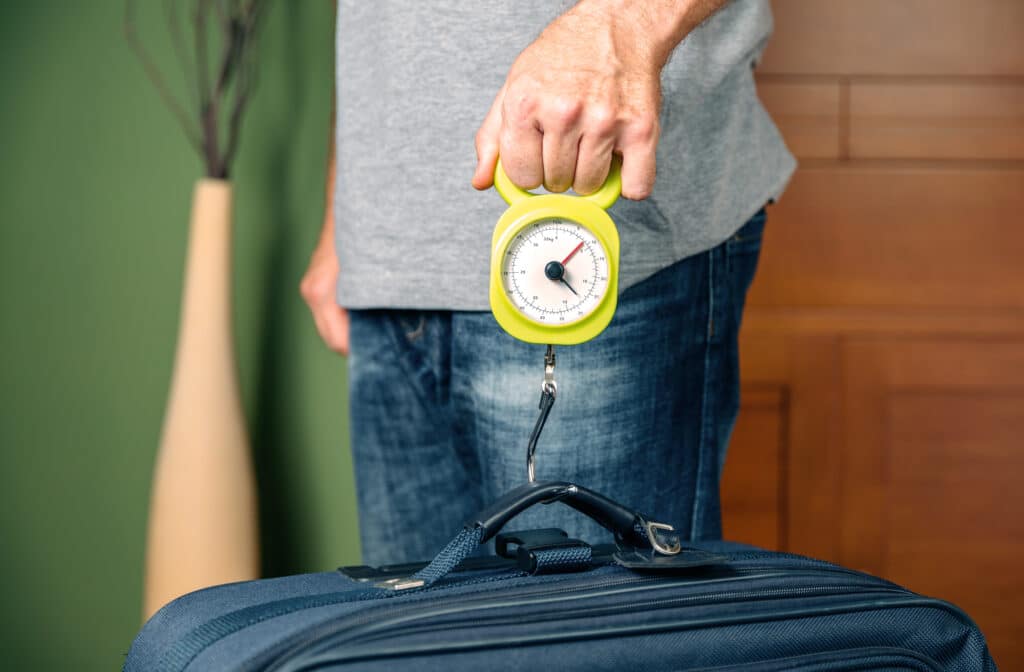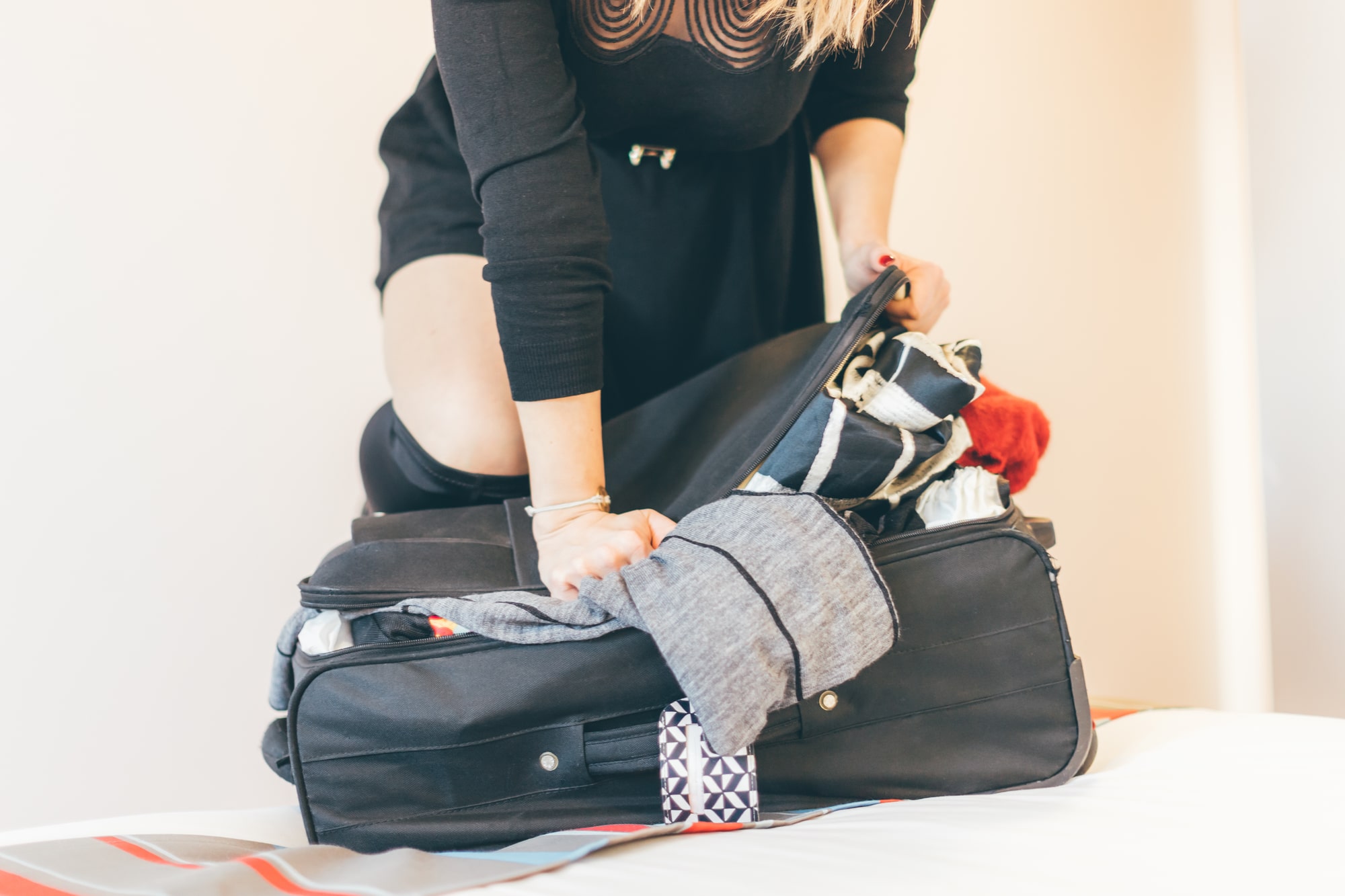It’s every traveler’s worst nightmare to make it to the airport and find out that their checked luggage is overweight. While TSA doesn’t have a limit on baggage weight, most airlines will have a strict policy for weight limits. So What Happens if Your Luggage is Overweight?
You will have to pay a fee for overweight baggage. If you want to avoid the fee, you can try one of the following:
- Rearrange your heavier items into your carry-on or personal bag
- If you traveled in a group, put your stuff in their checked bags
- Send some items home with whoever dropped you off
- Toss the items you can replace in the trash
- Ask the airport staff if they can check it anyway without the fee (it does occasionally work)
In general, an overweight bag is anything over 50 pounds. Sometimes airlines will allow passengers who are flying on a higher-class ticket like business or first class a higher baggage weight of 70 pounds before they need to pay any overweight baggage fees.
Furthermore, airlines won’t accept bags over 100 pounds, so if you are flying with anything too heavy, you should split your items between multiple bags.
If you know your bag is overweight and you have to check it, call your airline ahead of time to find out the fee and how you can pay it, so you are prepared when you arrive at the airport.
The overweight baggage fee depends on the bag’s weight and where you are flying, which we will detail in the next section.
What is the Fee for Overweight Baggage?
Your overweight baggage fee will depend on the airline you are flying, how much your bag is overweight by, and where you are flying. The overweight baggage fee is in addition to any money you already paid to check a bag.
For example, if you pay $50 for your checked bag, but it was overweight, and the overweight bag fee is $100, your total to check the bag is $150.
Let’s look at some examples of overweight baggage fees from a few airlines.
United Airlines’ overweight baggage fees depend on the bag’s weight and where you are flying. Any bags between 50 and 70 pounds have overweight baggage fees of up to $200 depending on the destination. Bags weighing between 70 and 100 pounds have overweight fees up to $400.
The fee for overweight baggage on American Airlines depends on if you are flying domestically or internationally and which region of the world you are flying in. All overweight bags between 50 and 70 pounds are $100 extra, no matter where you are flying.
If your bag is between 71 and 100 pounds, the baggage fee is between $200 and $450 for all flights except those to Europe, which have a maximum weight per bag of 70 pounds.
Here is a brief overview of the airlines we mentioned above as well as other major U.S. Airlines:
| Airline | Weight Limit | Size Limit (length+width+height | Baggage Fee | Baggage Policy Link |
|---|---|---|---|---|
| Southwest | 50 lbs | 62 inches | 51-100lbs = $100 fee | Southwest Baggage Policy |
| American Airlines | 50 lbs 70 lbs for First and Business Class | 62 inches | 51-70 lbs = $100 71-100 lbs = $200+ (varies by destination) | American Airlines Baggage Policy |
| United Airlines | 50 lbs 70 lbs for First and Business Class | 62 inches | 51-70 lbs = $200 71-100 lbs = $400 | United Baggage Policy |
| JetBlue | 50 lbs | 62 inches | 51-99 lbs = $150 | jetBLue Baggage Policy |
| Delta | 50 lbs | 62 inches | 51-70 lbs = $100 71-100 lbs = $200 | Delta Baggage Policy |
If you are concerned about overweight baggage fees and checking a bag in general, get to the airport early and give yourself plenty of time to talk to the baggage counter about your bags.
But, there are restrictions on how early you can check a bag. Read more about how early you can check a bag and the different airlines’ restrictions.
What is the Best Way to Weigh Luggage?

If you are concerned about your luggage weighing too much, either to lower the weight or so you are prepared to pay a fee, you should weigh it before getting to the airport. There are a few ways to weigh luggage.
The best way to weigh your luggage is to use a scale made specifically for luggage. These are typically hand-held scales that you hook your luggage onto by the handle. When you lift the bag on the hook, it will tell you how much it weighs.
FREETOO has a luggage scale that is small enough to fit in your pocket and will weigh up to 110 pounds. You can bring this with you on your trip so you can weigh your luggage anywhere.
If you don’t have a luggage scale, you can use a normal scale. But don’t put the luggage right on the scale. You should weigh yourself first, then grab your luggage and weigh yourself again while you’re holding the luggage.
The difference between the two weights is the weight of your bag. This method isn’t as accurate as a hand-held luggage scale, but it will give you a good idea of the weight of your luggage.
If you are already at the airport and need to weigh your luggage, you can find a scale by the baggage check area at most airports. These will cost you a few dollars, but making sure your bag is not overweight at the bag check counter is worth it.
Read about the best ways to weigh luggage here for even more information and product to help you.
You May Also Like: How Early Do Planes Start Boarding?
Why is there a weight limit on my luggage?
Bag weight limits on airplanes may seem annoying and, at times, arbitrary. You may wonder, what’s the difference between 50 and 51 pounds other than a hefty baggage fee?
There are a few reasons that airlines have such strict baggage weight restrictions.
First, the total weight of the luggage on a plane can only be so high. The maximum weight varies depending on the size of the plane and how far the plane is going, but airlines have to estimate the weight and ensure the total weight is not too high.
Since airlines cannot control how much the passengers and carry-on items weigh, they have to be strict with the weight of checked items. While one or two overweight bags won’t make a big difference, they still need to limit the weight of each bag. If they did not have a limit, everyone would bring too heavy bags, and it would pose a major safety issue.
Additionally, baggage weight limits protect the airline’s baggage handlers who load and unload the plane. Fifty pounds is the maximum weight that baggage handlers are expected to lift on their own.
Airlines will mark a bag with a sticker or tag if it weighs more than 50 pounds. Then when it reaches the plane, two baggage handlers will need to lift the bag in and out of the plane together.
Not only does this keep the workers safe, but it does slow down the loading and unloading process since another person needs to step in. So the excess labor and slower loading time are why airlines charge a fee.

